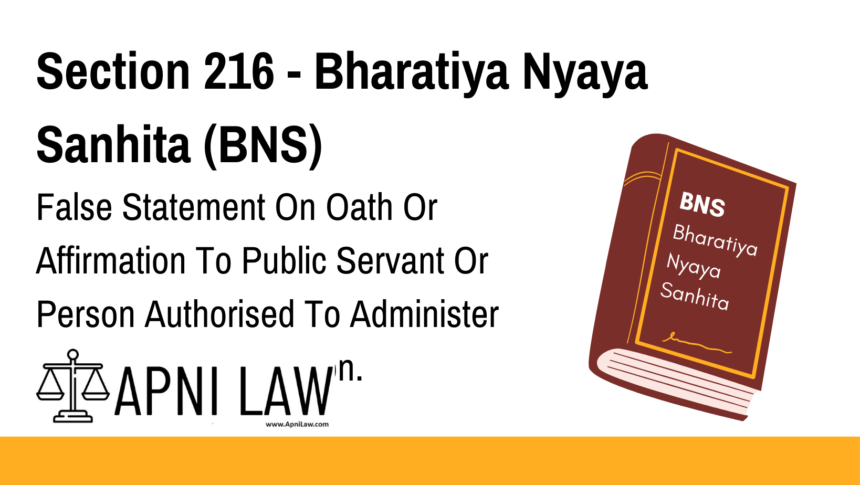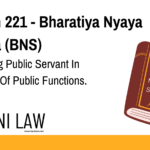Section 216 BNS – False Statement on Oath or Affirmation to Public Servant
Code: Section 216 BNS
Whoever, being legally bound by an oath or affirmation to state the truth on
any subject to any public servant or other person authorised by law to administer such
oath or affirmation, makes, to such public servant or other person as aforesaid, touching
that subject, any statement which is false, and which he either knows or believes to be
false or does not believe to be true, shall be punished with imprisonment of either
description for a term which may extend to three years, and shall also be liable to fine.
Explanation of Section 216 BNS
Section 216 of the Bharatiya Nyaya Sanhita (BNS) deals with cases where a person knowingly makes a false statement while under oath or affirmation before a public servant or authorized official.
This provision ensures that legal and administrative proceedings are not obstructed by false testimonies.
Key Provisions of Section 216 BNS:
- Who Does This Law Apply To?
- Any person who is legally bound to state the truth under oath or affirmation.
- What Constitutes an Offense?
- Knowingly making a false statement before a public servant or any authorized person.
- Punishment for Violation:
- Imprisonment: Up to three years.
- Fine: No upper limit specified.
- Both: In some cases, both penalties may be imposed.
Illustrations of Section 216 BNS
Example 1: False Testimony in Court
A person lies under oath while testifying in court, despite knowing the truth. This is a criminal offense under Section 216 BNS.
Example 2: False Affidavit Submission
An individual submits a false affidavit in a legal dispute, claiming facts they know are untrue. This offense is punishable under Section 216 BNS.
Example 3: False Declaration to a Government Officer
A person falsely declares income details under oath to a tax officer. They may be prosecuted under this section.
Common Questions and Answers on Section 216 BNS
1. What is the difference between Section 216 BNS and perjury?
Perjury, under Section 218 BNS, involves false statements made in judicial proceedings, while Section 216 BNS covers false statements made to any public servant or authorized person.
2. Does this section apply to false statements made in casual conversations?
No. Section 216 BNS applies only when the false statement is made under oath or affirmation before a legally authorized official.
3. Is Section 216 BNS a bailable offense?
Yes. Offenses under Section 216 BNS are generally bailable and non-cognizable, meaning arrest without a warrant is not allowed.
4. What is considered a “public servant” under this section?
A public servant includes judges, magistrates, police officers, tax officers, and government officials authorized to take statements under oath or affirmation.
5. What are the legal defenses under Section 216 BNS?
A person may avoid liability if they can prove:
- They genuinely believed their statement was true.
- The false statement was made due to mistake or misunderstanding.
Conclusion
Section 216 of the Bharatiya Nyaya Sanhita (BNS) ensures that statements made under oath are truthful, preserving the integrity of legal and administrative processes.
For more legal insights, visit ApniLaw today! 🚀








